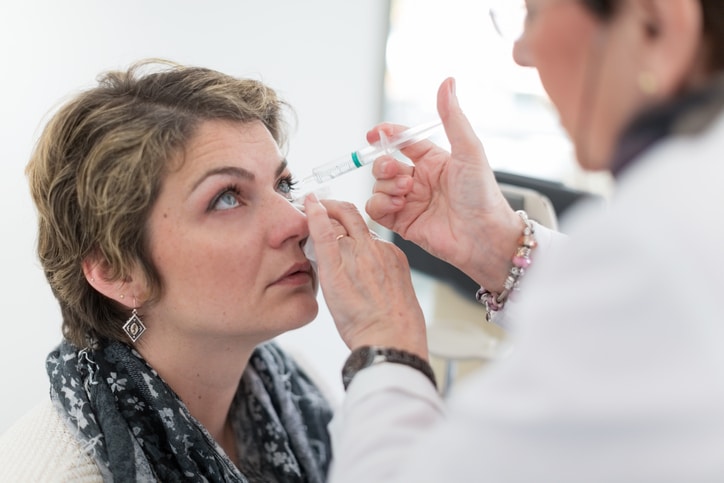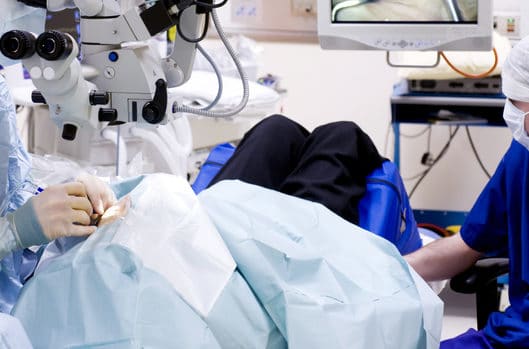Dr. Murrell specializes in cataract surgery. Performing thousands of cataract surgeries throughout his career, he receives rave reviews from patients and is proud to help clear their cloudy vision. Before each cataract procedure, patients will have one or more consultations, during which Dr. Murrell will help forge a shared plan for the results they want to achieve.
Have Your Cataracts Surgery Performed By Dr. Murrell
Having invested in the latest cataract surgery equipment and technology, Dr. Murrell can detect eye diseases that a standard exam cannot. Dr. Murrell can also treat many of these diseases if he can identify them in advance. This can also to improve the quality of the patient’s post-operation vision. Although some diseases cannot be cured, detecting them in advance allows Dr. Murrell to provide the patient with a more realistic expectation of their post-operative vision. Using this technology allows for a happier, healthier, and more educated patient.

What Are Cataracts?
A cataract is when the natural lens is no longer clear. The lens in your eye is initially clear and it focuses the images seen by the eye on the light-sensitive retina at the back of the eye. As cataracts develop the lens begins to become cloudy. This increases to the point where it eventually impacts vision, particularly at night. Cataracts are the most common cause of vision loss in people over the age of 40; they are the principal cause of blindness across the world.
What Causes Cataracts To Develop?
The most common reason is when the proteins present in the lens start to denature. As this denaturing condition worsens the lens gets yellow and cloudier to the point where it interferes with the vision more, blocking some of the light coming through the lens. This is usually a slow process, and the patient doesn’t often realize their vision is becoming more cloudy. Eventually, the cloudiness will be to a degree that it can appear you’re looking through a perpetually dirty window.
Who Is At Risk For Developing Cataracts?
Cataracts are common as we age. It’s estimated that by the time an American turns 80, he or she has a 50/50 chance of either having cataracts or having already had surgery to address them. Surgery is the only treatment option for cataracts.
Intraocular Lenses (IOL) By Dr. Murrell
Cataract surgery has become very quick, high tech, very effective, minimal to no discomfort procedure that has very good to excellent visual results that can last a lifetime. Improved technology has significantly increased the precision and safety of cataract surgery and gives the patient many options in regard to their post operative vision.
During cataract surgery, the cataract (the cloudy lens in your eye) will be removed and a new artificial intraocular lens (IOL) will be put back in your eye. I have chosen two companies for the IOL's that I use, Alcon and RxSite
The cataract patient today has many IOL options to choose from depending on their lifestyle needs and how much independence they want from glasses. Let's review these IOL options so that you can make a well thought out decision for your vision and your life style. I would like you to choose the IOL that is best for you. There are six types of Alcon IOL's available:
- Alcon Standard IOL
- Alcon Toric IOL
- Panoptix IOL
- Panoptix Toric IOL
- Light Adjustable Lens (LAL)

Alcon Standard IOL
This is by far the most common IOL implanted (approximately 80% of the time). It is a spherical lens that will correct for one focal point (usually for distance) and will not correct the eye for astigmatism (irregular cornea). After surgery with this IOL, the patient will always need prescription glasses for uncorrected astigmatism and for intermediate (computer and dashboard) and near (reading). All insurers cover this IOL. Dr. Murrell’s office can help with the insurance pre-certification and costs upon verification of benefits.
Alcon Toric IOL
This is the second most common IOL implanted (approximately 14% of the time). It will correct both spherical error and astigmatism (irregular cornea). The patient will usually select this IOL with a focal point at distance. This allows the patient to see well at distance without prescription glasses. However, the patient may rarely still need a weak pair of glasses for distance to see perfectly and will definitely require intermediate and near glasses. There is an extra cost associated with this IOL that is not covered by insurance.

PanOptix IOL:
This IOL gives vision at all 3 focal points: distance, intermediate (computer/dashboard) and near (reading). This IOL is becoming more popular and I am implanting them now in 5% of the patients.
Most of the patients will not need glasses for distance, intermediate or near.
This IOL design may give glare &/or halos of light (disphotopsias) when looking at bright objects (auto lights) at night. While some patients have this, very few are bothered by it.
Remember, this Panoptix IOL is a premium IOL that is not covered by insurance and will be a an out of pocket cost to you.
Light Adjustable Lens (LAL):
This is the newest IOL that I use. It is made by RxSite. It is the first IOL that can be adjusted after the cataract operation. This enables the patient to customize and perfect their vision. The LAL can also eliminate mild to moderate astigmatism.
Remember, this is a premium IOL that will not be covered by insurance and will be an out-of-pocket cost to you.
PanOptix Toric IOL:
This is the Panoptix IOL with astigmatism correction. It is for patients that want all 3 focal points and also want their moderate to severe astigmaism corrected. It has the same advantages and disadvantage as mentioned above.
Remember, this is a premium IOL that will not be covered by insurance and there will be an out of pocket cost to you.
As you can see, modern cataract surgery and the IOL options provide todays cataract patient with many choices. Learning as much as you can about these choices prior to your cataract surgery evaluation with me in my office will help to insure that you get the type of vision requirements that you desire. There is also much more detailed information on the internet regarding these IOLs and I encourage you to check them out.
The Cataract Surgery Procedure
Dr. Murrell performs a minimally invasive, small-incision, no-stitch cataract surgery called phacoemulsification (phaco) surgery. During the procedure, a tiny incision is made in the eye to make room for a small ultrasonic probe. This probe breaks up or emulsifies, the cloudy lens into tiny pieces. The pieces are then suctioned out through the probe. Because of its small size, the incision can heal on its own and only requires topical (eye drop) anesthesia, although you do have other options (see Anesthesia). There are no sutures needed.
Once the cloudy lens has been removed, the artificial IOL (that you have chosen), is implanted in the eye. Advanced foldable IOLs can be inserted through the same small incision through which the original lens was removed. The entire procedure with Dr. Murrell lasts just 10-15 minutes.
Cataract Surgery Patient Testimonial
"I was quite skeptical of having this procedure - cataract removal and lens implant. On our first visit, Dr. Murrell talked with me at length about procedure, lens options, cost and answered every question I had. With full confidence, I had the procedure and am very pleased and happy with the results. There was minimal discomfort for a day and I never knew anything had been done because there was no discomfort or problems. The thing I noticed first was how bright colors are. The entire staff was very friendly, accommodating, professional, efficient, and knowledgeable. My sincere thanks to Dr. Murrell and his staff. It is very comforting to be in a surgical situation and find everyone caring about your comfort. Thanks again."
Types Of Anesthesia Used For Cataract Surgery
There are five choices of anesthesia:
- Topical 1: numbing eye drops
- Topical 2: numbing eye drops + IV sedation
- Block 1: a pre-operative injection of anesthesia medication to numb your eye
- Block 1 plus IV: a pre-operative injection of anesthesia medication to numb your eye + IV sedation to make you feel more relaxed
- General anesthesia (in extremely rare, special cases)

Where Will My Cataract Surgery Be Performed?
The cataract surgery takes place at the Amarillo Cataract and Eye Surgery Center. It's important to realize that this is Amarillo’s first, and only, outpatient surgery center dedicated exclusively to eye and eyelid surgery. Another key point is that the surgery center has an outstanding reputation and a well trained and certified staff. Dr. Murrell has been a proud owner of the Surgery Center since its initial year of inception in 1991. Additionally, it has grown into one of the busiest outpatient cataract surgery centers in the United States, currently ranking in the top percentile in the nation for the number of cataract procedures performed per year.
How Is Recovery From Cataract Surgery?
Immediately after surgery, the patient will wear an eye patch. Someone will need to drive you home. We will also give you a protective shield to wear when sleeping for a week. Vision may be blurry at first but rapidly improves within a few days. This is completely normal.

There may be some itching and irritation, but its important not to rub or exert pressure on the treated eye. Heavy lifting is out, as it puts pressure on the eyes. Eye drops prevent inflammation and infection.
Patients can resume normal activities in a few days. Full healing should be complete in about one month. Most patients need to wear eyeglasses, at least for some tasks, after their surgery. This can depend on your choice of the replacement lens. If both eyes have cataracts, we will then schedule the second eye for surgery three weeks after the first surgery.
Can Cataracts Grow Back Or Redevelop After Surgery?
Cataracts occur in the eye’s natural lens through the buildup of proteins over time. This cannot happen to the artificial intraocular lens Dr. Murrell has placed after removing your cataract-clouded natural lens. So, no, cataracts cannot return in the eye or eyes you have had surgery upon. If you’ve only had surgery on one eye, there is a good possibility the other eye will also need cataract surgery one day.
Does Cataract Surgery Hurt?
(Some people put off replacing their cataract-clouded lenses because they fear the surgery will be painful. The reality is that this procedure has minimal to no discomfort. You can choose your anesthetic: 1) anesthetic drops alone, 2) anesthetic drops + a block (an injection of anesthetic around your eye), 3) anesthetic drops & IV sedation (a mild sedative to help you relax). 4) drops, block & IV sedation

After your surgery, you may have some minor eye discomfort, but this is easily manageable with over-the-counter pain medication.
What Happens After My Cataract Surgery?
Following the surgery, you will have two post-op visits. During your first visit, our certified technicians will check your vision, incision, IOL, eye pressure, and make sure your eye is comfortable, as well as the post op things to not do. At your two-week visit, we will dilate your eyes (enlarge your pupils with eye drops) in order to check your IOL & retina (the back of your eye). After the second visit, you will be sent back to your referring optometrist for continued eye care. If you do not have an optometrist for a one month follow up, my staff and I will suggest one that I am connected with.
When Can I Resume Normal Activities After Cataract Surgery?
For the first week after your cataract surgery with Dr. Murrell, you need to take it easy. You need to limit the blood pressure to your face, so anything strenuous is completely off-limits. You can take easy walks.
From there, Dr. Murrell will give you an idea of the timeframe for different activities. It’s important to avoid strenuous activities or heavy lifting for a few weeks to be sure your eye fully heals. You’ll have a follow-up within a few days after your surgery, so Dr. Murrell can see how well you are progressing then. You’ll be cleared to drive at this time, or possibly earlier.
Any swimming will need to wait for about one month. It’s also a good idea to avoid getting dust or debris in your eyes; this minimizes the risk of infection.
Results Of Cataract Surgery
Cataract surgery with Dr. Murrell is incredibly rewarding. Where your vision had become cloudy, as if looking through really dirty eyeglasses, everything is clear once again. Plus, it’s no longer simply a matter of removing the clouded lens and replacing it.

Advances in technology and techniques allow the correction of nearsightedness, farsightedness, and astigmatism with this surgery. Modern multifocal IOLs also are able to reduce the need for prescription glasses after cataract surgery, something that was basically a requirement just a decade ago.
Risks Of Cataract Surgery
Cataract surgery is the most successful surgery performed across the world. It takes just a few minutes, doesn’t involve a difficult recovery, and is immensely rewarding for the patient. This surgery is incredibly common — over half the population will develop cataracts at some point in their lives. Complications are very rare, and if any of these happen they can usually be successfully treated. These are the risks:
- Inflammation
- Infection
- Bleeding
- Swelling
- Drooping eyelid
- Dislocation of the IOL
- Retinal detachment
- Glaucoma
- Loss of vision

What Is The Cost Of Cataract Surgery?
The actual amount you pay for cataract surgery is contingent upon the type of intraocular lens you select. If you select a standard IOL and you are over 65, Medicare could cover the entire procedure, after any deductible or co-pays are covered. If you opt to have more advanced IOLs, such as multifocal (they allow for excellent vision at all distances and can remove the need for reading glasses) or toric (they correct for astigmatism) options, your cost will be higher. Dr. Murrell's staff will estimate the possible costs of your cataract surgery during your consultation.
But when you really think about it, what’s the value of having crystal clear vision that may not even require prescription glasses any longer? If you’ve been seeing the world through cloudy cataract lenses, you’ll be amazed at your eyesight after this procedure. Your only question will likely be why you waited so long.
Cataract Surgery FAQs
Can Cataract Surgery Be Performed on Both Eyes at the Same Time?
In most cases, cataract surgery is performed on one eye at a time to ensure proper healing and minimize risk. If both eyes have cataracts, the second procedure is usually scheduled after the first eye has healed—typically within a few weeks. However, bilateral cataract surgery may be considered in select cases, such as patients with certain medical conditions or logistical constraints.
How Soon Can I Drive After Cataract Surgery?
You should see well enough to resume driving within a couple of days of cataract surgery, but this depends on individual healing and vision clarity. Your doctor will assess your vision at a follow-up appointment, typically a day or two after surgery, to determine when it is safe to drive. Until then, arrange for transportation to and from your appointments.
How Do I Take Care of My Eyes in the Days After Cataract Surgery?
Postoperative care is crucial for a smooth recovery. Here are some essential tips:
- Use prescribed eye drops as directed to prevent infection and reduce inflammation.
- Avoid rubbing or applying pressure to your eye.
- Wear protective sunglasses outdoors to reduce sensitivity to light.
- Refrain from swimming, heavy lifting, or strenuous activities for at least a week.
- Follow up with your surgeon to monitor healing progress.
Can Cataract Surgery Fix Astigmatism?
Yes, cataract surgery can correct astigmatism with the use of certain IOLs. For example, toric IOLs are specifically designed to address astigmatism and provide clearer vision without needing glasses or contact lenses. If astigmatism correction is a priority, discuss lens options with Dr. Murrell before the procedure.
How Long Do Intraocular Lenses Last?

How Can I Prevent Cataracts?
While aging is the most common cause of cataracts, some lifestyle choices can help slow their development:
- Wear sunglasses with UV protection to shield your eyes from harmful rays.
- Maintain a healthy diet rich in antioxidants, such as leafy greens, citrus fruits, and fish.
- Manage conditions like diabetes, which can increase the risk of cataracts.
- Avoid smoking and limit alcohol consumption.
- Schedule regular eye exams to detect early signs of cataracts.
Is Cataract Surgery Covered by Insurance or Medicare?
Medicare and most private insurance plans typically cover the cost of standard cataract surgery when deemed medically necessary. However, premium intraocular lenses (such as multifocal or toric IOLs) may involve additional out-of-pocket expenses. Check with your insurance provider and your surgeon’s office to understand your coverage and potential costs.
Can Cataract Surgery Improve Night Vision?
Yes, cataract surgery significantly improves night vision by removing the cloudy lens that causes glare and halos around lights. Many patients notice an immediate improvement in their ability to see clearly at night, reducing issues with driving and overall visual comfort in low-light settings.
Schedule A Consultation
To schedule a Cataract consultation appointment with Dr. Murrell at our office in Amarillo, call: (806) 351-1177.
"You deserve the best, and so do your eyes." – Dr. Murrell
